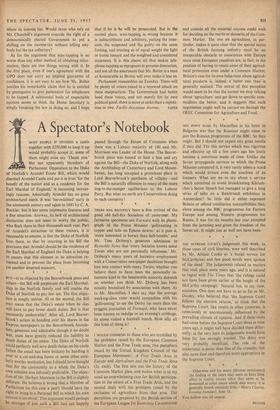I WOULD COMMEND IO those who,are mystified by the problems
raised by the European Common Market and the Free Trade area, two pamphlets issued by the United Kingdom Council of the European Movement : A Free Trade Area in Europe and Agriculture and the Free Trade Area (2s. each). The first sets out the history of the Common Market plan, and makes what is to my mind an overwhelming case for British participa- tion to the extent of a Free Trade Area, and the second deals with the problems raised by the exclusion of agriculture from that area. The pamphlets are prepared by the British section of the European League for Economic Co-operation and contain all the material anyone could wish for deciding on the merits or demerits of the Com- mon Market. The one on agriculture, in par- ticular, makes it quite clear that the special status of the British farming industry need be no insuperable obstacle to association with Europe since most European countries are, in fact, in the position of having to retain some of their agricul- tural protection even under a Common Market. Britain's case for its own behaviour about agricul- tural products is, indeed, a better one than is generally realised. The moral of this pamphlet would seem to be that the sooner we stop talking about 'agriculture' and get down to specific com- modities the better, and it suggests that such negotiation might well be carried on through the OEEC Committee for Agriculture and Food.


































 Previous page
Previous page